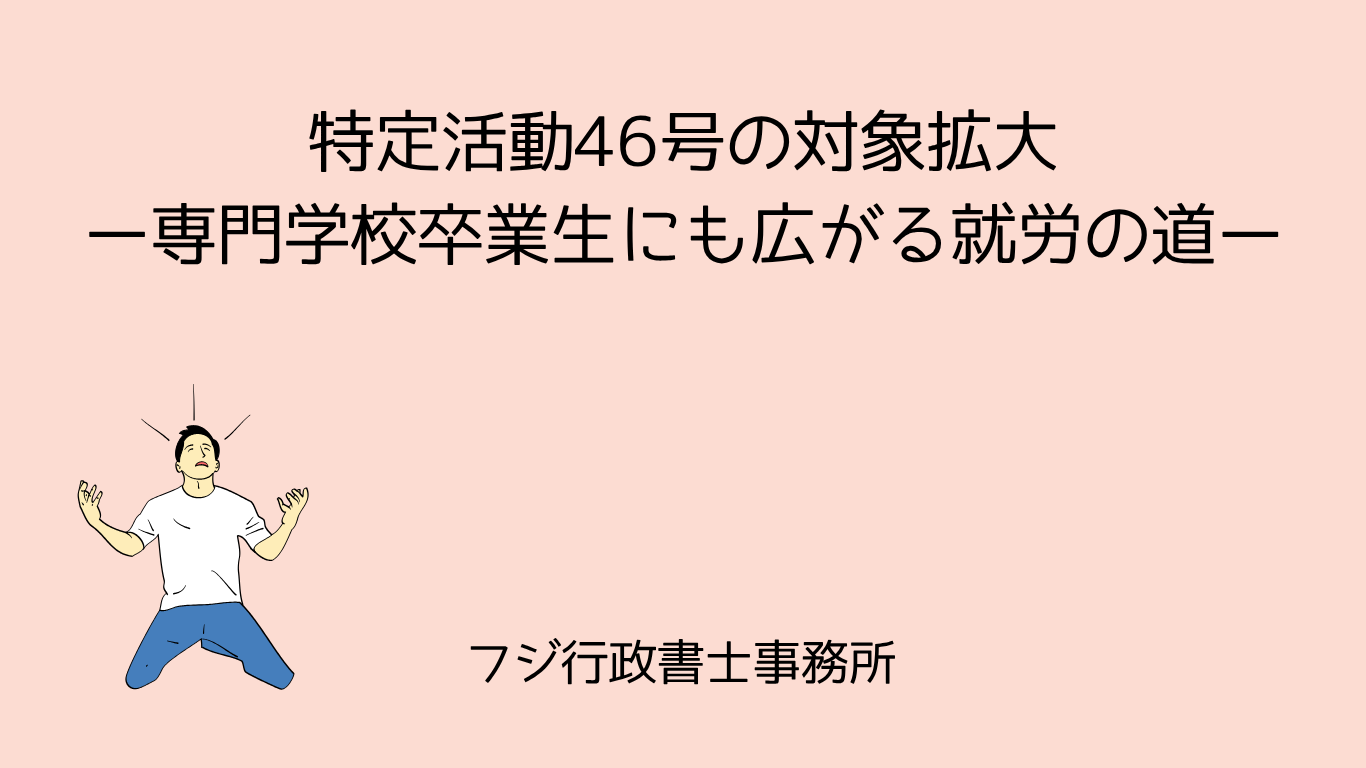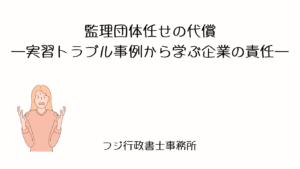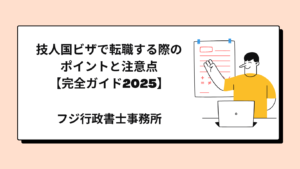本邦大学等卒業者(特定活動46号)の対象拡大と専門学校卒業生への新たな道
Expansion of Designated Activities No.46: New Career Paths for Vocational School Graduates
日本で学んだ外国人留学生が卒業後も日本で働き続けるためには、在留資格の選択が非常に重要です。その中でも「特定活動46号」は、これまで大学卒業者を中心に活用されてきた制度でした。しかし令和6年(2024年)の制度改正によって、専門学校や短期大学の卒業生にも対象が広がり、日本でのキャリア形成の可能性が大きく拡大しています。本記事では、制度の趣旨や改正の背景、対象拡大の内容、今後の展望について詳しく整理します。
For foreign students who have studied in Japan, choosing the right residency status after graduation is crucial for continuing their careers in Japan. Among the various options, “Designated Activities No.46” has traditionally been a status mainly for university graduates. However, the 2024 legal reform expanded eligibility to include graduates of vocational schools and junior colleges, significantly widening career opportunities in Japan. This article explains the purpose of the system, the background of the reform, the expansion of eligibility, and future prospects.
特定活動46号の制度趣旨
Purpose of Designated Activities No.46
特定活動46号は、日本の大学や大学院などを卒業した外国人が、日本企業や団体において修得した知識や応用的能力、高い日本語力を活かして幅広い業務に従事することを認める在留資格です。従来の「技術・人文知識・国際業務」などでは、主に専門的・技術的な業務に限定され、製造現場やサービス業務などは主な業務として認められないケースが多くありました。一方で特定活動46号は、一定の条件を満たせば、そうした分野での就労も可能になる点が大きな特徴です。
Designated Activities No.46 is a residency status that allows foreign graduates of Japanese universities and graduate schools to engage in a wide range of work by applying their academic knowledge, practical skills, and high-level Japanese proficiency. Unlike the “Engineer/Specialist in Humanities/International Services” status, which focuses mainly on specialized or technical roles, this status allows work in sectors such as manufacturing and services if certain conditions are met.
ただし、法律上の資格を持つ人しか従事できない独占業務(弁護士、医師、建築士など)や、風俗関連の業務については対象外とされています。これは他の在留資格と同様に、明確な制限が設けられています。
However, activities requiring professional licenses (e.g., lawyers, doctors, architects) and those related to the adult entertainment industry remain strictly excluded, as is the case with other residency statuses.
改正前の対象者
Eligibility Before the Reform
制度改正以前は、特定活動46号の対象は「日本の大学を卒業して学士を取得した外国人」や「日本語能力試験N1レベルまたはそれに相当する日本語力を有する外国人」に限られていました。専門学校や短期大学を卒業した外国人は、たとえ高い専門性や日本語力を有していても、この制度を利用することはできず、卒業後のキャリアパスに制約がありました。そのため、在留資格の選択肢としては特定技能や技能実習、あるいは一部の技人国で認められるケースに限られる状況が続いていました。
Before the reform, eligibility for Designated Activities No.46 was limited to foreign nationals who graduated from Japanese universities with a bachelor’s degree or those who possessed Japanese language proficiency at the N1 level or equivalent. Even highly skilled vocational or junior college graduates with strong Japanese skills were excluded, leaving them with limited options such as Specified Skilled Worker, Technical Intern Training, or a few Engineer/Specialist pathways.
制度改正による対象拡大
Expansion of Eligibility Through Legal Reform
こうした状況を踏まえ、外国人留学生のキャリア形成の機会を広げるために、文部科学省は令和5年に「外国人留学生キャリア形成促進プログラム」という新たな認定制度を創設しました。この制度は、専修学校(専門学校)の専門課程で質の高い教育を行い、日本社会での理解や即戦力としての能力を育成することを目的としています。
To address these limitations and promote career opportunities for foreign students, Japan’s Ministry of Education launched the “Foreign Student Career Development Promotion Program” in 2023. This program certifies vocational schools that provide high-quality education and aim to foster foreign graduates with practical skills and a solid understanding of Japanese society.
この制度に基づき、令和6年2月に特定活動告示が改正され、次のような人々が特定活動46号の対象に追加されました。
Based on this program, the notification regarding Designated Activities was revised in February 2024. The following individuals are now eligible:
- 文部科学大臣の認定を受けた専修学校の専門課程を修了し、「高等専門士」の称号を授与された者
- 短期大学または高等専門学校を卒業後、大学で一定の単位を修得し、所定の審査を経て学士を取得した者で、日本語能力試験N1レベルを有する者
- Graduates of certified vocational schools who have completed specialized courses and earned the title of “Advanced Specialist.”
- Graduates of junior colleges or technical colleges who obtained additional university credits, passed the required evaluation, acquired a bachelor’s degree, and possess Japanese Language Proficiency Test (JLPT) N1 or equivalent.
この改正によって、大学を卒業していない外国人留学生であっても、一定の条件を満たせば特定活動46号の対象となり、幅広い業務に従事できる可能性が開かれました。
Through this reform, even those who have not graduated from a university can qualify for Designated Activities No.46 if they meet the set requirements, enabling them to work in a wider range of fields.
専門学校卒業生にとっての実務的な意味
Practical Impact on Vocational School Graduates
専門学校は、実践的な教育を重視し、業界に直結するスキルを習得できる場です。しかし、在留資格の面ではこれまで不利な立場に置かれることが少なくありませんでした。特定活動46号の改正によって、こうした専門学校卒業生が日本語力と学修成果を活かし、企業で幅広い業務に従事できるようになったことは、実務上非常に大きな意味を持ちます。
Vocational schools emphasize hands-on, industry-oriented training. However, their graduates were often disadvantaged in terms of visa eligibility. The reform allows these graduates to leverage their Japanese proficiency and academic achievements to work in diverse business sectors, which is a major practical shift.
企業側にとっても、専門的な知識や技能を身につけた留学生を採用しやすくなるというメリットがあります。特に人材不足が深刻なサービス業や製造業の分野では、専門学校卒業生を戦力として受け入れることができるようになる点は重要です。
For companies, this change makes it easier to hire skilled foreign graduates with specialized training, particularly in service and manufacturing industries facing severe labor shortages.
今後の展望と課題
Future Prospects and Challenges
対象が拡大したことで、専門学校卒業生にも就労のチャンスが広がりましたが、特定活動46号を活用するためには、依然として高い日本語力が必要です。日本語能力試験N1レベルは、多くの留学生にとって大きなハードルであり、制度を十分に活用するには、専門的知識とともに日本語の運用能力を高める努力が求められます。
While eligibility has expanded, applicants still need high-level Japanese proficiency (JLPT N1 or equivalent), which remains a significant barrier for many students. Developing both professional expertise and language ability is essential for effectively using this status.
また、企業側にも制度の理解と準備が必要です。特定活動46号を利用した採用には、在留資格の要件や対象業務の理解が欠かせません。制度改正直後は、企業・学校・学生の間で情報の行き違いが生じることもあるため、実務レベルでの丁寧な確認が重要です。
Employers must also understand the requirements and eligible activities under this status. Since the reform is recent, clear communication among companies, schools, and students is crucial to avoid misunderstandings.
この改革は、日本で学んだ多様な人材にとって、日本でのキャリア形成の新たな扉を開くものであり、企業にとっても人材確保の大きなチャンスとなります。専門学校や短期大学を卒業した留学生が、知識と日本語力を活かし、日本社会で活躍する姿が今後ますます増えていくことが期待されます。
This reform opens new career pathways for diverse foreign graduates in Japan while offering companies greater opportunities to secure skilled talent. In the coming years, more vocational and junior college graduates are expected to use their skills and language abilities to play active roles in Japanese society.
最後まで読んでいただきありがとうございました。
<日本語・英語>「こんなことで相談していいの?」
—— 大丈夫です! あなたの不安に丁寧に向き合います
“Is it okay to ask about something like this?”
—— Of course! We will listen carefully and address your concerns
フジ行政書士事務所では、日本で暮らす外国人の方が安心して生活できるよう、ビザのことはもちろん、手続き・仕事・暮らしの中で感じる不安や悩みにも寄り添っています。
「誰に相談したらいいかわからない」そんなときこそ、フジ行政書士事務所にご相談ください。
あなたにとっていちばん良い形を、一緒に考えていきます。
At Fuji Gyoseishoshi Office, we support foreign residents in Japan so that they can live here with peace of mind. We are here not only for visa matters, but also to help you with procedures, work-related concerns, and daily life issues.
If you ever think, “I don’t know who to talk to,” that’s exactly when you should reach out to us.
Let’s work together to find the best solution for your situation.
※LINEをご利用でない方は、▶ お問い合わせフォームはこちら からもご相談いただけます。
* If you don’t use LINE, you can also contact us via the ▶ Contact Form.









コメント